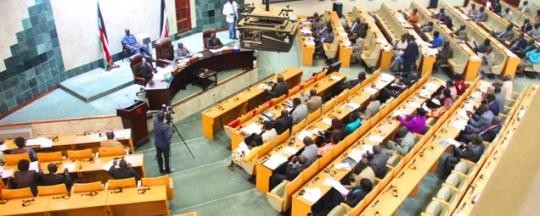A group representing 160 national and 140 international non-governmental organizations (NGOs) in South Sudan says that it has “significant concerns” with the NGO Bill passed by parliament yesterday.
The group, called the NGO Forum, said that the bill as passed may hinder rather than facilitate their work.
“NGOs are in favour of regulation in principle — it would be much easier for NGOs to operate within a coherent and consistent regulatory environment…However, there are still significant concerns that certain provisions of the NGO Bill will not regulate NGO operations, but rather hinder their ability to serve South Sudanese people at a time when needs are escalating due to the ongoing conflict,” the NGO Forum said.
The NGO Bill seeks to regulate the work of NGOs, including monitoring of their finances and activities, restrictions on the percent of foreigners allowed to work for each group, and registration requirements.
The Forum said one of its key issues is how the Bill will affect civil society groups including advocacy and human rights organizations.
“The work of Civil Society Organisations (CSOs) should not be seen as threatening or challenging to the government but rather supporting its growth and development,” the Forum said. “The future of South Sudan relies on a vibrant and free civil society. So to this extent that this bill we be used to restrict civil society activities rather than regulate then in a democratic manner, we remain highly concerned.”
Meanwhile, the Forum warned of “enormous implications” of the Bill on the response to South Sudan’s humanitarian crisis, saying that if the new legislation leads the government to restrict the work of relief agencies “then this will have potentially catastrophic effects for the large amounts of the South Sudanese population that rely on NGOs to provide basic services and life saving aid.”
The consortium complained that they already face “mounting administrative pressure and often subject to arbitrary enforcement of rules and regulations,” as well as increasing harassment and violence against NGOs at a time when food insecurity is increasing.
“If the Bill makes getting assistance to people harder rather than easier, it could cost lives at a time of tremendous suffering for South Sudanese communities,” NGO Forum said. “As policies and procedures are developed by Government, it must be assured that this Bill is not used against the very public it is meant to serve.”
Related:
South Sudan parliament cuts number of allowed foreign aid workers (12 May)
S Sudan NGO Bill restricts relief groups (11 May)




